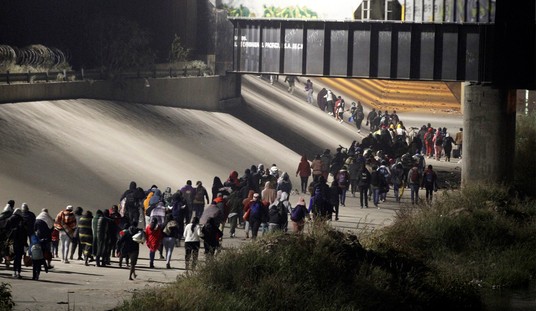Last night, Republicans took control of the Senate in the 114th Congress. This morning, the Obama administration announced the population of Guantanamo Bay would drop by one.
The Defense Department said Fouzi Khalid Abdullah Al Awda had been cleared for transfer to Kuwait.
Al Awda, 37, is an experienced terrorist recruiter with London ties, returning to his home country as intelligence agencies have been on the alert for Western jihadist recruitment.
“Detainee is assessed to be a member of al-Qaida,” reads the 2008 DoD assessment. “Detainee’s name is included on al-Qaida affiliated documents, and he was reported to have sworn bayat (oath of allegiance) to UBL. Detainee has been identified as an associate of UBL and his spokesman, Sulayman Abu Ghayth. Detainee is a reported member of a London-based al-Qaida cell under Abu Qatada and is assessed to be an extremist recruiter and courier. Detainee attended militant training at al-Qaida and Lashkar-e-Tayyiba (LT) camps in Afghanistan and Pakistan and was identified as receiving suicide training.”
He then “participated in hostilities against US and Coalition forces and served on an Islamic committee providing inspiration to fighters in Tora Bora.”
The assessment noted his history of “jihadist combat” and ties to “extremist affiliated” NGOs, and adds that he “has received coded communications from a Kuwaiti extremist.”
Al Awda was determined to be a high risk to the U.S., a high detention threat and of high intelligence value.
His father was a Kuwaiti pilot, and Al Awda came to the U.S. as a young child when his father was sent to train here. Al Awda graduated from the University of Kuwait in 1998 with a degree in Islamic studies and traveled to Pakistan shortly thereafter; the same year he was spending time with Abu Qatada’s group in London. He then worked for the Kuwaiti government in its Alms and Charities Agency.
“Detainee was also identified as being in Bosnia fighting alongside Arab mujahideen,” the report states.
In 1999, he was in Houston on what he said was a visit to his sick grandmother.
Al Awda was in the mountainous border region of Afghanistan near Pakistan when the Sept. 11, 2001, attacks happened. He was soon captured by Pakistanis and turned over to the U.S. in January 2002.
“While in detention, detainee has made statements that illustrate hostile intentions towards the US.” The report also notes he’s in good health.
The DoD said today that a July 14 review board “determined continued law of war detention of Al Awda does not remain necessary to protect against a continuing significant threat to the security of the United States.”
“The United States is grateful to the Government of Kuwait for its willingness to support ongoing U.S. efforts to close the Guantanamo Bay detention facility. The United States coordinated with the Government of Kuwait to ensure this transfer took place consistent with appropriate security and humane treatment measures.”
There are now 148 detainees remaining at Guantanamo.
Late last month, Fox News reported that as many as 20 to 30 former Guantanamo Bay detainees, some set free within the past few years, are believed to have joined terrorist groups fighting in Syria.
“Well, we know that some of the detainees that have come out of Guantanamo have gone back to the fight, to the battlefield. We’re aware of that,” Defense Secretary Chuck Hagel told reporters on Oct. 31. “And we think that overall the policy of getting to close Guantanamo is clearly in the interests of the United States, as the president has articulated, which when I — I was in the United States Senate, I supported it.”
“It’s an imperfect world. It’s a dangerous world,” Hagel continued. “This is why we pay so much attention to getting commitments from host countries in securing those commitments and doing everything we can within our power to assure that those commitments, not to allow those detainees to go beyond what is required in order to secure them in these different host countries that take them. But we do know that some have joined the fight.”
“Host countries” have included Sudan, where leader Omar al-Bashir is wanted for war crimes and crimes against humanity. The country received one detainee last December.
Asked if this recidivism bothered him, Hagel replied, “Yes, of course it does.”
Chairman of the Joint Chiefs Gen. Martin Dempsey added, “We believe that the recidivism is a — is a relatively small fraction of those detainees, which have been placed into conditions where their risk — where their risk of recidivism is mitigated.”
“But even one would not make someone wearing the uniform very content,” Dempsey said. “So we — I provide my advice in every case to the secretary of Defense who, as you know, is the certifying official. And the exact number is actually being assessed inside of the intelligence community, so I can’t comment on that.”
Sen. John McCain (R-Ariz.) said the 30 percent who return to battle aren’t just going in as low-level fighters, but “they also are in positions of leadership.”
“In one case, there are many Yemenis, he wants to send them back there. So rather than to have a place it to incarcerate them where they belong, particularly there’s many who have been judged too dangerous to be released,” McCain said. “The president wants to get rid of them in order to close Guantanamo. That’s the overriding factor in his calculations and it’s disgraceful, because in the long run, it puts the lives of American men and women serving in the military in danger. It’s a fact.”








Join the conversation as a VIP Member